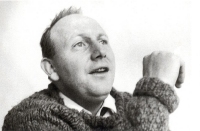Frank Harte
| Frank Harte | |
|---|---|
 |
|
| Background information | |
| Birth name | Frank Harte |
| Born |
14 May 1933 Chapelizod, County Dublin, Ireland |
| Died | 27 June 2005 (aged 72) |
| Genres | Traditional Irish, Sean Nós |
| Occupation(s) | Architect, Lecturer, Singer |
| Labels | Hummingbird |
| Associated acts | Donal Lunny |
Frank Harte (14 May 1933 – 27 June 2005) was a traditional Irish singer, song collector, architect and lecturer. He was born in Chapelizod, County Dublin, and raised in Dublin. His father, Peter Harte, who had moved from a farming background in Sligo, owned 'The Tap' pub in Chapelizod. Frank emigrated to the United States for a short period, but later returned to Ireland where he worked as an architect, lecturer at DIT (Dublin Institute of Technology) in Rathmines, Dublin and in later life fully engaged in songs in many ways.
Frank Harte's introduction to Irish traditional singing came, he said, from a chance listening to an itinerant who was selling ballad sheets at a fair in Boyle, County Roscommon.
In the valley of Knockanure
"This is a far cry from Dublin street songs, but it was the first song I heard, sung by a travelling man, that made me aware that we had a tradition of songs telling about the joys and sorrows, the tragedies and battles of a people in a way that I found irresistible. From that first hearing I have been fascinated by the idea of the story told in song."
Frank became a great exponent of the Dublin street ballad, which he preferred to sing unaccompanied. He was widely known for his distinctive singing, his Dublin accent having a rich nasal quality complementing his often high register. His voice mellowed considerably by the time of his later recordings, allowing for an expressive interpretation of many love songs such as 'My Bonny Light Horseman' on the album 'My Name is Napoleon Bonaparte'. This is contrasted sublimely by Frank's cogent interpretation of the popular 'Molly Malone'. He also became more accustomed to singing with accompaniment which is not strictly part of the Irish singing tradition and did not come naturally to him.
Though Irish Republican in his politics, he believed that the Irish song tradition need not be a sectarian or nationalist preserve: "The Orange song is just as valid an expression as the Fenian". He believed that songs were a key to understanding the past often saying :"those in power write the history, while those who suffer write the songs, and, given our history, we have an awful lot of songs.". Though considered a stalwart of traditional Irish singing and well aware of it, Frank did not consider himself to be a sean-nós singer.
...
Wikipedia
